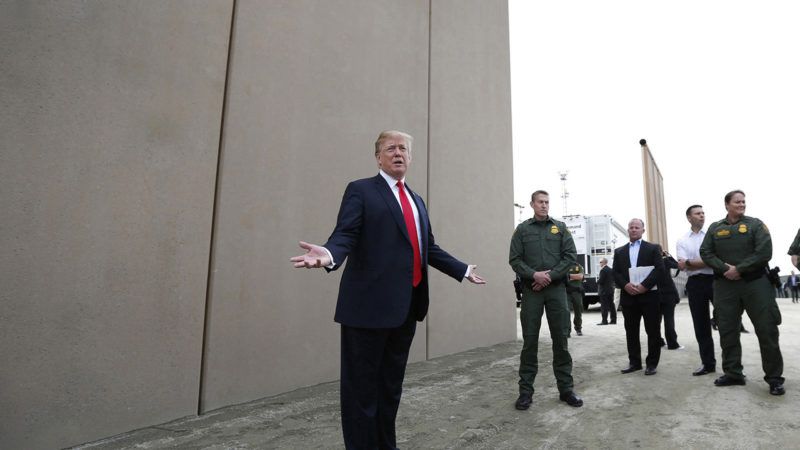Trump Will Raid Pentagon's War on Terror Slush Fund To Build His Border Wall
The administration also plans to move $2.2 billion originally earmarked for purchasing vehicles, ships, and aircraft to cover wall construction costs.

As part of an overall plan to divert $3.8 billion from the Pentagon to pay for the construction of a wall on the border with Mexico, President Donald Trump is planning to drain about $1.6 billion from the slush fund that pays for much of America's post-9/11 wars in the Middle East.
Foreign Policy's Lara Seligman reports that the White House sent a memo to Congress on Thursday outlining plans to redirect military spending for the border wall. The administration plans to move $2.2 billion originally earmarked for purchasing vehicles, ships, and aircraft into an anti-drug trafficking program that has already been tapped to provide for wall construction costs. The other $1.6 billion in border wall funding will come from the budget used to pay for America's foreign wars, Foreign Policy reported.
That budget, officially known as the Overseas Contingency Operations (OCO) account, started as an innocuous supplemental appropriation to fund the military response to the 9/11 terrorist attacks. But, as Reason contributor Veronique de Rugy put it in 2015, the account "quickly became a slush fund that allows policymakers to spend gobs of money with little oversight and fatten the Pentagon's base budget when the spending caps are put into place, seeing as OCO funding is exempt."
Since 2001, Congress has funneled more than $2 trillion through the OCO budget, according to the Congressional Research Service. That includes $77 billion in 2019, equal to about 5.6 percent of all federal discretionary spending last year—and larger than the State Department's entire budget. All that spending is above-and-beyond the Pentagon's own $700 billion budget last year.
None other than Mick Mulvaney, the former congressional budget hawk turned director of the Trump White House's Office of Management and Budget, has called the OCO budget a "slush fund." During the Obama administration, Mulvaney said the White House's use of the OCO budget to avoid congressionally imposed budget caps was "disingenuous" and "deceptive," and he co-sponsored a bipartisan bill to limit how OCO funding could be used.
Now, however, Mulvaney is presiding over a similar abuse of the OCO budget, using it as a back door to provide funding for a border wall that Congress seems unwilling to provide via the normal budgetary process.
Even so, cutting funding for the Pentagon's literal war chest may a worthwhile move. But spending that money on an ineffective vanity project along the Mexican border is questionable at best. Trump's budget calls for spending more than $7 billion on the border wall this year, enough to build about 885 miles of new fencing by 2022, according to The Washington Post.
The border wall might be Trump's most visible campaign promise, but it won't do much to address the supposed threat of illegal immigration. Most illegal immigrants to the United States don't hop the border; they land at airports and then overstay their visas. It also wouldn't do much to stop the flow of drugs into the United States, because they're mostly smuggled in through checkpoints.
Still, there are few policy maneuvers during Trump's time in office that better reflect the ethos of his 2016 campaign, during which Trump railed in nearly equal measure against endless, wasteful foreign wars and the supposed threat posed by illegal immigrants.
Thursday's announcement also does a nice job of summing up libertarians' mixed feelings about the Trump era: Instead of wasting $1.8 billion on unnecessary wars half a world away, Trump will waste that money right here at home.


Show Comments (143)